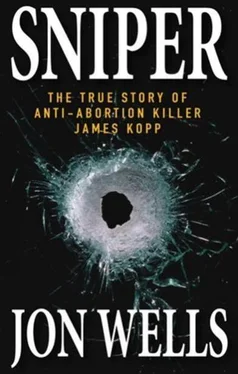Some days were better than others. The jail was primarily used for immigration matters. He had been originally held there because his case involved extradition. He felt like a bug under a microscope in prison. The FBI was listening to his phone calls. Reading his mail. He wrote Latin acronyms on the envelopes of his outgoing mail so God might look over them, keep them safe from the Edgars. He had time to think about his life, his future. And his success, to the extent that it might be called success, he thought. Success? His campaign of terror had made an impact. There were doctors less willing to offer abortion services for fear of violence. The doctors Kopp had shot, and allegedly shot, no longer practiced medicine.
There was one notable exception, and it held a considerable irony that even Jim Kopp could appreciate on a certain level. In Vancouver, Dr. Romalis, allegedly one of Kopp’s victims, continued to practice medicine, but had to alter his practice somewhat. He had always delivered babies as part of his practice. A major part, in fact. But delivering babies, like other surgeries, is a physically demanding job. After he was shot in the thigh, he no longer had the physical stamina to deliver babies—it can involve being on your feet a long time. Romalis couldn’t stand long enough. The wound, the hole punched in his leg by the assault rifle, had put a stop to that. So Dr. Garson Romalis could only do procedures that required little time standing. He could perform what are called, in obstetrics phraseology, terminations. Abortions.
* * *
Starke, Florida
Summer 2003
Paul Hill awaited his appointment with the end. He had been on death row ever since admitting to murdering Dr. John Britton and a security guard in broad daylight outside a clinic in Pensacola in 1994. He had shown no remorse for his act. He was in good spirits. Radical pro-lifers who supported Hill’s actions continued to keep in touch with him. He even corresponded on occasion with journalists. He returned a letter from a Canadian reporter:
I appreciate your interest in the principles for which I stand. I would be glad to meet you and answer any questions you have… I hope it all works out for you. I am currently in the final stages of writing a book. The working title is Mix My Blood With The Blood Of The Unborn. It presents the best case I can muster, I think it is rather convincing and compelling, for upholding the duty to defend the unborn with the means necessary (as required by the moral law, and as we would defend ourselves). At any rate, I look forward to meeting you.
In Christ, Paul Hill
The date was set for September 3. He was scheduled to be the third inmate executed in Florida that year, and the 57th since the state reinstated capital punishment in 1979. Jim Kopp heard the news that a group of pro-lifers planned to gather at the site of the execution in Starke, to protest the death sentence and show their love and support for Hill, and the unborn. Kopp was excited. He wrote a long letter and had a friend post it on a website, urging pro-lifers to “join him” in Florida. It was titled, “I’m Going Back To Florida.” In part the letter read:
Sometime between now and when we die, we will have a different feeling about how we look at the whole, tragic pro-life capitulation which is taking place right now. And, grudgingly or not, just like Schindler, you will realize that there was something more you could have done, in between rescue and sidewalk work, and what Paul Hill did, and you will realize that you could have and should have done it. Be it forceful or not, “legal” or not, practical or not, efficacious or not. I assure you, the reasons we use to excuse ourselves will pale at the moment of our deaths… Come to Starke because you’re a brand new pro-lifer and clueless. Come to Starke because you’re a burnt-out, old curmudgeon (although I certainly have no direct experience in this matter). Come to Starke to look at blue herons. Just come to Starke. The Lord will take care of the rest… I’m looking forward to seeing you there. I’ll be there in spirit. The rest of me will be very, very sad at a remote location, but my spirit will be with you and Paul and his beautiful and God-chosen family.
Five people had shot and either killed or wounded abortion providers or clinic workers in the United States: Michael Griffin, John Salvi—who committed suicide—Shelley Shannon, Hill and Kopp. Hill would be the first put to death. Five known shooters—shooters: a terribly crude word, really, Kopp mused in his letter, “but let’s use it. Five known shooters. And now two of them, sadly, will be dead. And another [Griffin], sadly, and due to perhaps some unprecipitated—though not thereby necessarily unholy—action, essentially repented of his action. He took the ‘aw shucks, I’m sorry, wish I hadn’t done it’ route.”
On Tuesday, September 2, Paul Hill met with several reporters selected by the state. He smiled for the cameras and said he expected a great reward in heaven upon his passing. The next day he ate his last meal, alone: steak, baked potato, broccoli with hollandaise sauce, salad, orange sherbet, a glass of iced tea. He sat in the solitary-confinement cell. Outside, the sky turned black as a storm blew in. Hill had a final visit with his wife and son, his mother and father, and two sisters. His two daughters had visited earlier in the week. None of his family came to the observation room. The family of Hill’s victims also stayed away. About 50 pro-lifers stood outside the prison gates, holding signs. There was a roll of thunder. IV tubes were inserted into both of his arms. He made his final statement: “If you believe abortion is a lethal force, you should oppose the force and do what you have to do to stop it,” he said calmly as he lay strapped to a gurney, staring at the ceiling and speaking into the microphone that hung from it. “May God help you to protect the unborn as you would want to be protected.”
Moments later, the chemicals pumped through his veins: first the sedative, then a paralytic agent and, finally, potassium chloride to stop his heart. Witnesses watched him gasp for air, swallow, lick his lips. His eyes fluttered, closed, and he went still. Hill was declared dead at 6:08 p.m. When the news reached Jim Kopp, his heart pounded, his mind trying to process it all, sort through his feelings. “I never knew of anyone dying on a predictable day and hour,” he wrote. “I don’t know how to deal with it. I can’t deal with sudden death, either, though.”
* * *
Miami Beach, Florida
November 11, 2003
A former soldier reading verse from the Army of God Manual. He wasn’t going to be another Paul Hill. Stephen Jordi admired Paul, he had flown north to Starke to protest at Hill’s execution. Hill had sent Jordi a letter, thanking him for his moral and financial support. Tactically, perhaps he would be more like Jim Kopp. Details of the story appeared later in news reports, quoting an affidavit filed in court. Stephen Jordi bought gasoline cans, flares, starter fluid, propane tanks. He wanted to blow up an abortion clinic. C-4 plastic explosives might be his best bet. But there were other ways to do it, too. A propane tank bomb. Pipe bomb.
He met again with his new friend. The friend shared Jordi’s views on the need to use force in the abortion war. Was the time ripe to strike? Jim Kopp had been sentenced to life in prison, Paul Hill executed, and Eric Rudolph, who bombed a clinic in Alabama, arrested—all within the space of five months. If Jordi decided to hit a clinic, he would be a marked man. On the other hand, George W. Bush, a pro-life Republican, was in the White House, and the FBI’s focus was now on al-Qaeda. He had no intention of ending up strapped to a gurney like Hill, or getting caught like Rudolph or Kopp. “As long as I keep hitting places, they’ll keep after me,” he told his friend. “But it’s like trying to catch a cockroach in a house. They won’t get me.”
Читать дальше












